Brio is an advanced electrostatic air purifier or air cleaner (the terms are synonymous). It is categorized as a portable air purifier, since it can be moved from room to room, or to different places in a room. Brio cleans the air using a patented technology solution, developed at the University of Washington. Brio is different from HEPA air purifiers in three ways: Brio uses electrostatic filtration which draws particles out of the clean air flow and HEPA is a form of mechanical filtration which blocks particles. This technology difference results in a performance difference: Unlike HEPA air purifiers, Brio's particle removal technology is non-clogging, so there is no drop off in airflow between filter changes. And this in turn creates the third major difference between Brio room air purifiers and HEPA air purifiers: Because Brio doesn't clog, its high-capacity air filters last much longer than similarly size HEPA air purifier filters. Brio will save you on filter replacements over the years - a cost that many don't think about when buying an air purifier, but one that adds up all the same.
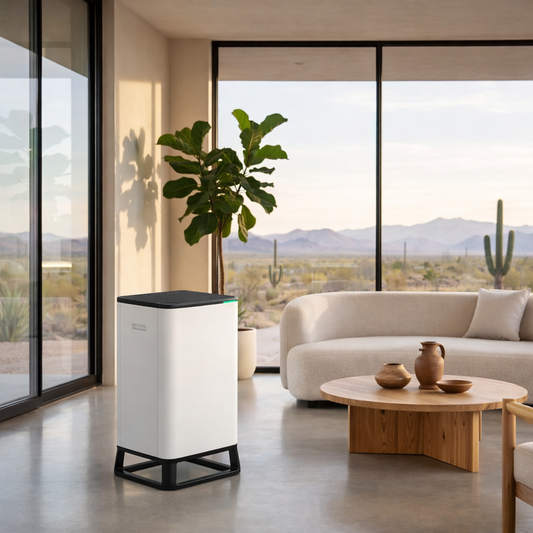
Clean Air Starts Today!
Bring clean, healthy air to your home with the Brio 650. HEPA-free and powered by patented Advanced Particle Removal Technology (APART), Brio is independently tested to remove smoke, viruses, mold, allergens, dust, and pet dander.
Why You’ll Love the Brio 650
- Cleans large spaces fast: Up to 1,300 sq ft
- Ultra-quiet operation: Sleep, work, and relax without distractions
- Simple maintenance: One-year filters with smart alerts
- Safe for your family: Zero ozone, ASHRAE 241 compliant, UL Listed, CARB Certified
Enjoy peace of mind knowing the air you breathe is cleaner, healthier, and safer — all year long.
Independent Testing. Ultrafine Removal. Real Results.

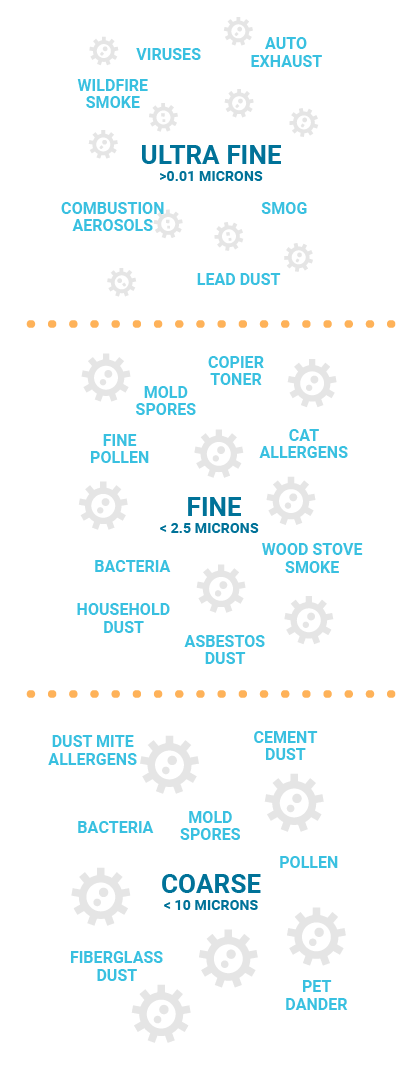
Outdoor & Urban Pollutants:
Wildfire smoke, smog, vehicle exhaust, gas-stove emissions
Viruses & Pathogens:
Airborne viruses, MS2 SARS-CoV-2 surrogates
Household Allergens & Dust:
Pet dander, dust mites, mold, mycotoxins, pollen, fine debris, lead, asbestos
Fast, free delivery
30-Day Risk Free Trial
Stay Safe
Smart Style
Tested. Certified. Trusted.

Ozone Safe

Verified CADR

UL Safety Tested

Patented Technology
Why Brio? Only Brio does all this:

Traps Pollution

Captures Viruses and Bacteria

Stays Effective

Deep Cleans

Saves Money
Why Brio? Best-rated air purifier for home and office
-
"Big Cleaning for Big Rooms: I’m impressed by the Brio air purifier’s performance."
-
"Excellent performance. Unique filtration: 95% Rating Brio is an air purifier that uses a unique filtration system with fantastic results."
Why Brio? Constant clean airflow and superior dust collection
Brio will remove airborne dust in your home or office. Brio works without filter clogging, so your airflow stays high and more dust, dander, pollen and other PM2.5 can be removed. Testing shows Brio collects 60 grams of dust while remaining at 90% of the original clean air delivery rate. HEPA purifiers can't match that.
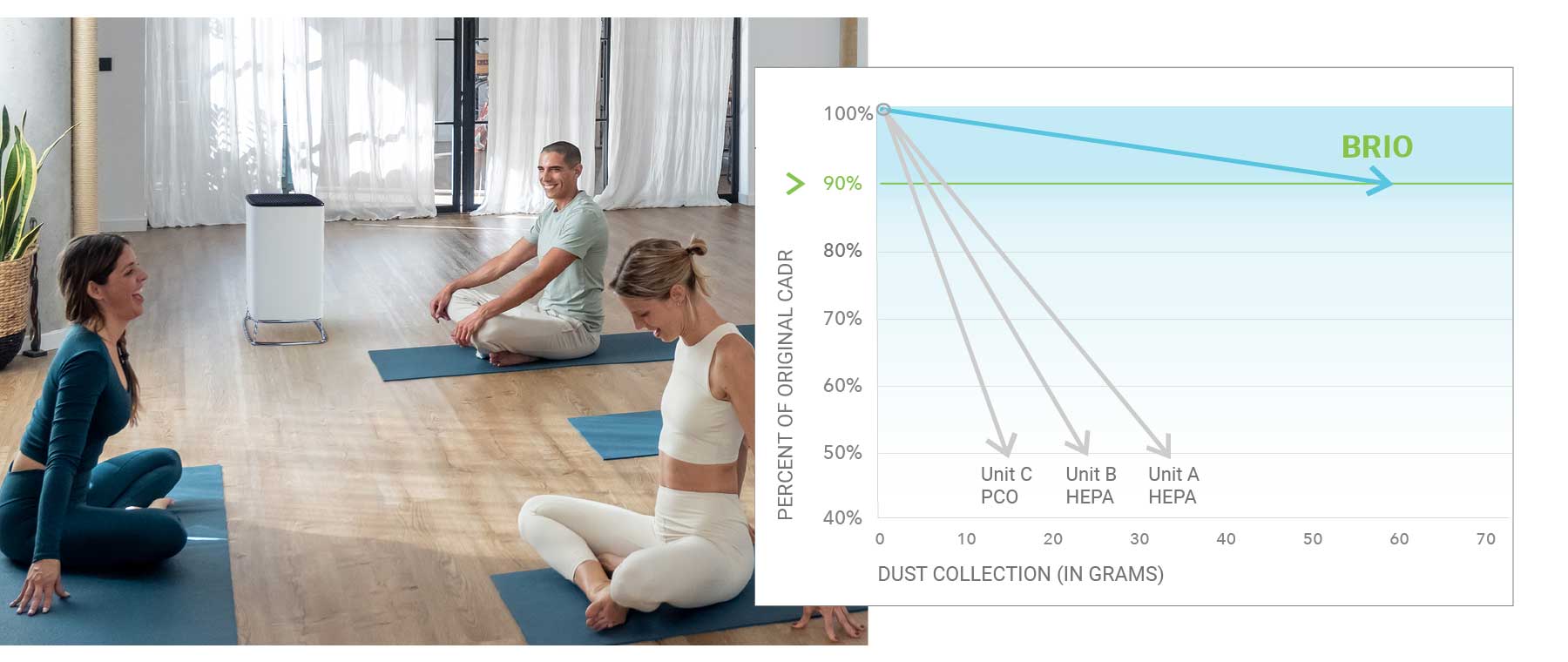
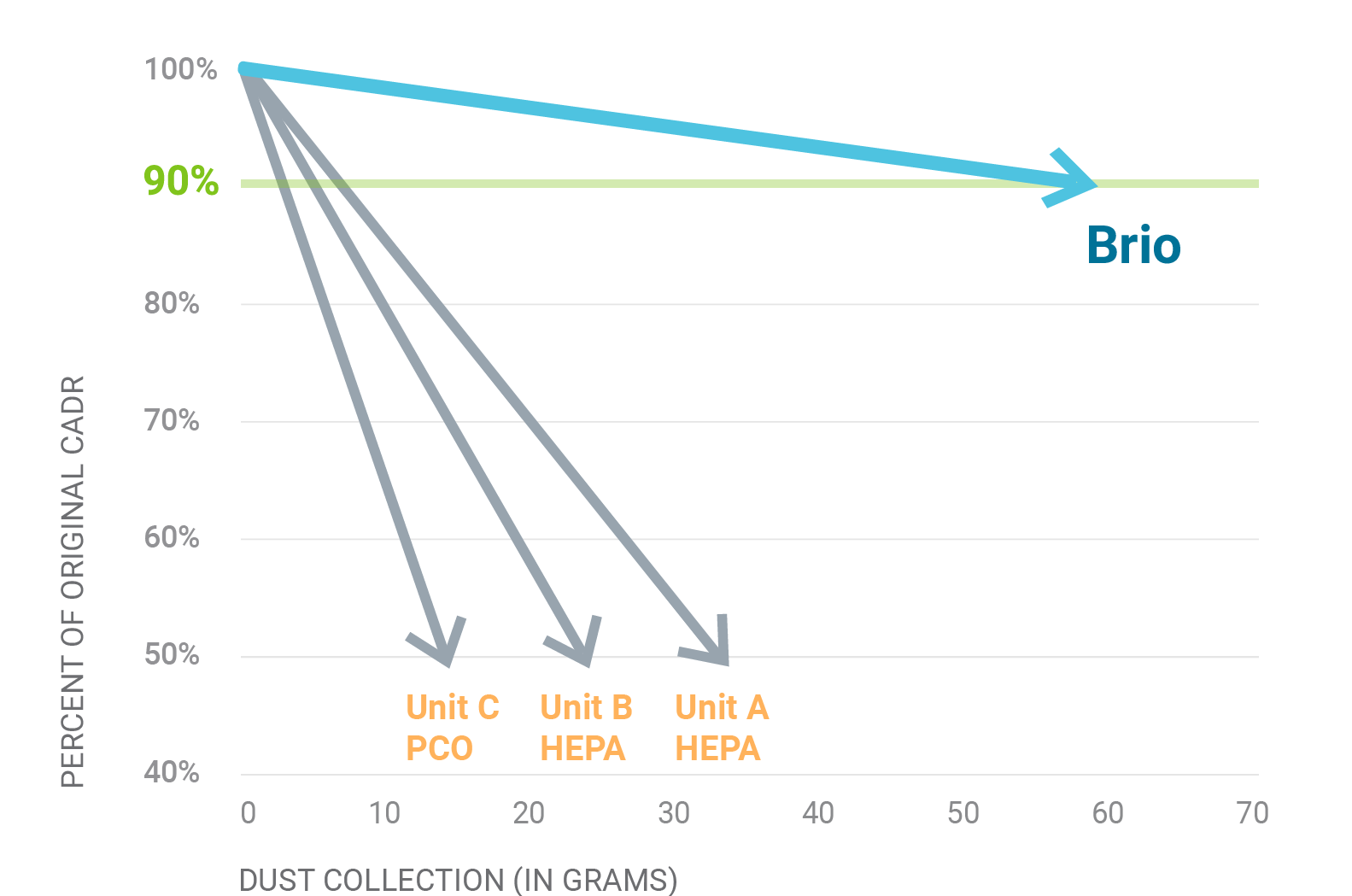
Why Brio? A truly effective air purifier
Brio air purifiers deliver constant clean air, removing fine and ultrafine particles with no performance drop off between filter changes. We make filter costs low so that you will change filters when needed (usually once a year or less). And we publish all of our performance information (like CADR and noise on low, medium, and high speeds) - something you should expect from every air purifier you compare to Brio. See more Brio performance results here.
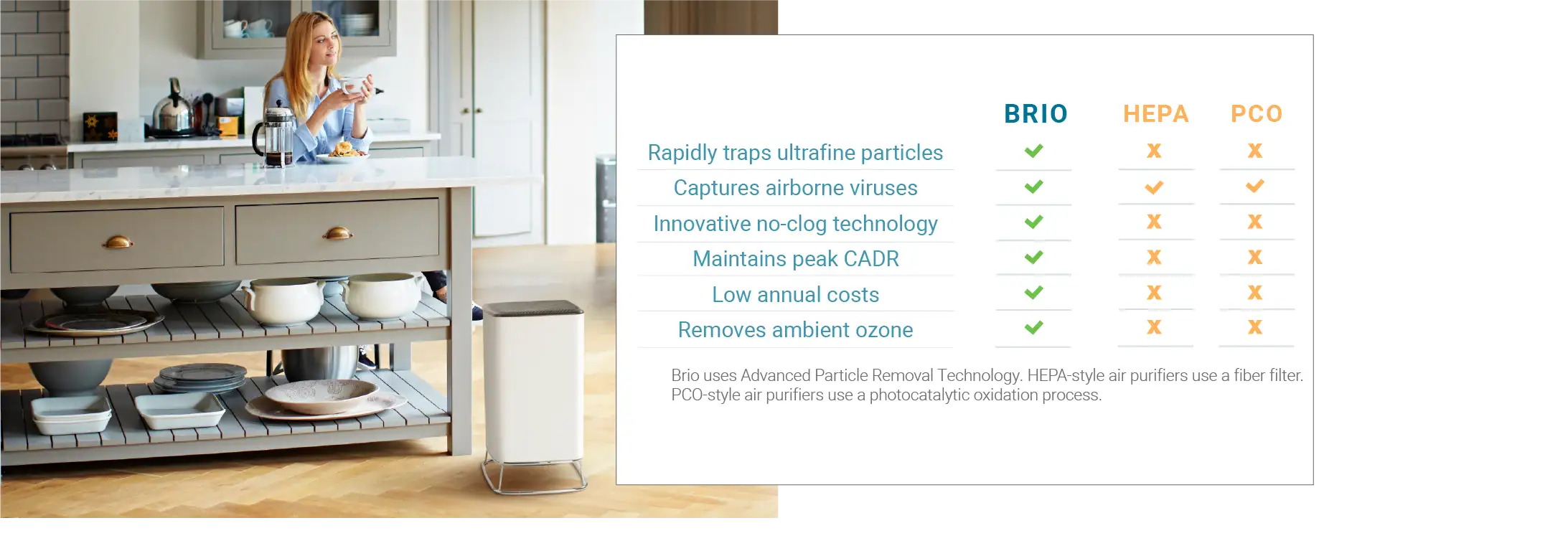
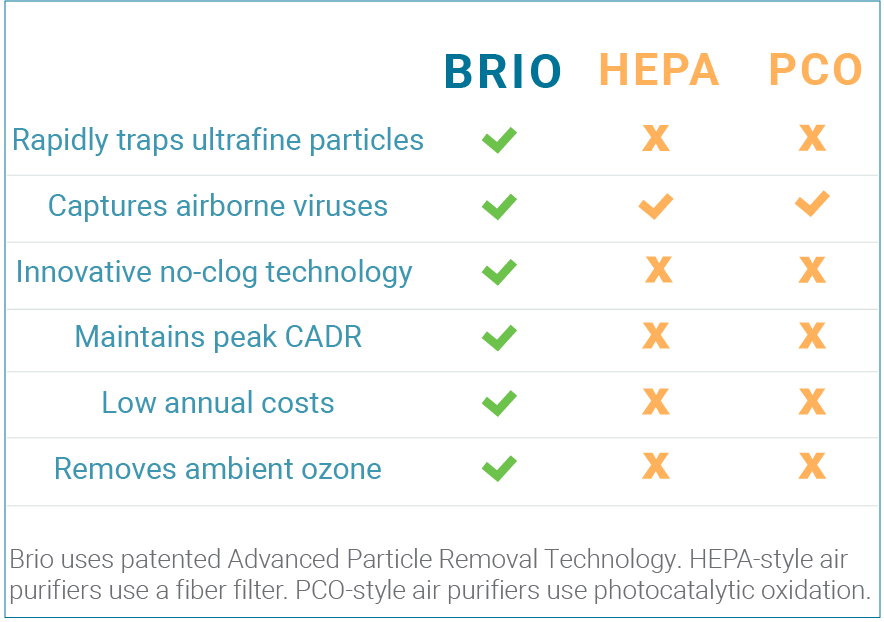
Why Brio? With airborne viruses, minutes matter
Brio quickly removes dangerous, airborne viruses and other ultrafine pathogens to improve your indoor air quality--in as little as 15 minutes. Don't settle for anything slower.

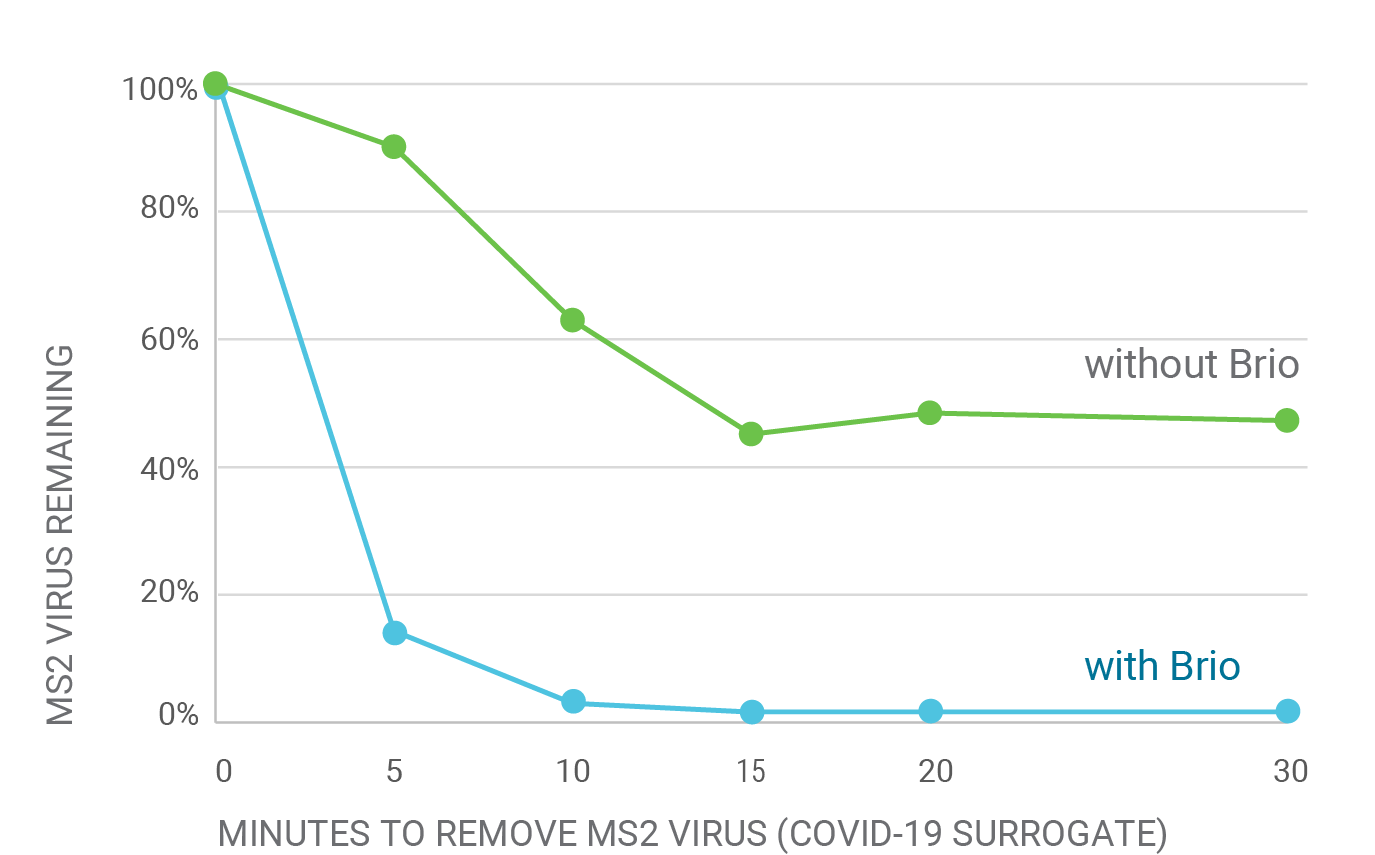
Why Brio? Money-saving, high-capacity filtration
To match the constant performance level of one Brio APART Collection Cartridge, the tested HEPA-style and Photocatalytic (PCO) air purifiers would need 5-10 filter changes. So Brio means less maintenance, less waste, and a lot less expense, year after year.
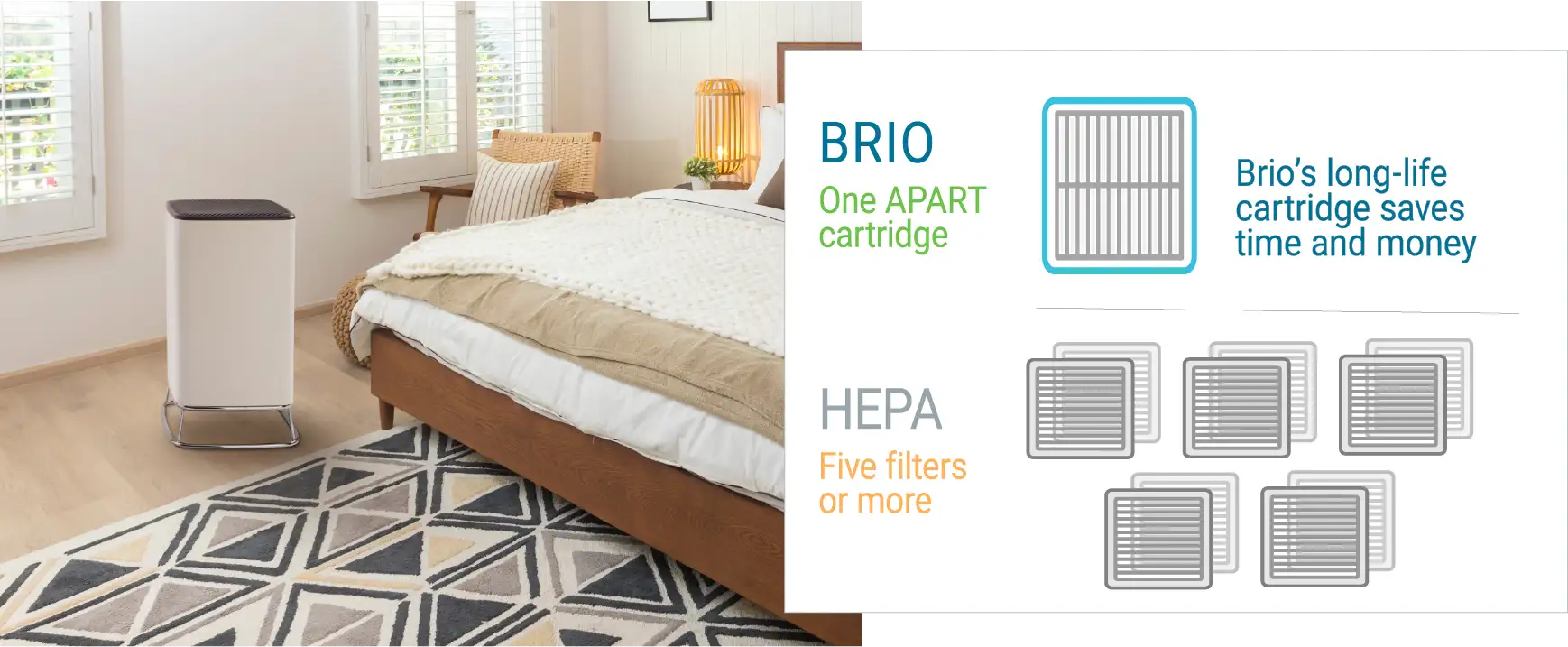
FAQ: All about indoor air quality and air cleaners
What is Brio? How is it different than HEPA?
How long will the APART Collection Cartridge last?
Brio’s APART technology draws particles out of the airflow, so there’s nothing to clog or slow the clean air delivery rate. And the APART Collection Cartridge is designed to hold a high volume of particles. Together these features add up to a long cartridge life. Your actual environmental conditions and use will determine how often it needs replacing. In less-polluted areas, the cartridge may last much longer than a year. In areas with higher, ongoing, or extreme pollution, the cartridge may need changing more often.
In general, we suggest changing the APART Collection Cartridge using Brio’s Check/Change Indicator as a guide or once every 12 months.
Is Brio the best air purifier for wildfire smoke?
We think so! Brio is highly effective in removing ultrafine, airborne wildfire smoke particles. Wildfire smoke particles may be as small as 0.4-0.7 microns. Independent testing shows that Brio’s APART particle removal technology effectively traps particles in this size range (and smaller!) including wildfire smoke. And because Brio doesn't clog, you can be confident smoke particles are being removed effectively and rapidly.
How does an air purifier remove mold?
Because mold is seems to spread on surfaces, it may come as a surprise that it can be transmitted through the air. More precisely, mold spreads through airborne mold spores too small to see without magnification. So using an effective air purifier, like Brio is an important step in reducing the spread of mold in your home or office. Looking for the best air purifier for mold?
How does an in-room air purifier like Brio remove viruses including COVID-19? Pathogens? Bacteria?
For an air cleaner to reduce viruses in the air, it must be able to remove small airborne particles (in the size range of 0.1-0.5 microns).
In independent lab tests, Brio’s APART technology effectively removes particles including COVID-19 surrogate, in this size range, in 15 minutes. Brio also quickly removes airborne bacteria particles, reducing the opportunity for these to spread infections.
It is important to note, however, that reducing virus particles is just one part of protection plan, as explained by the EPA:
“When used properly, air purifiers can help reduce airborne contaminants including viruses in a home or confined space. However, by itself, a portable air cleaner is not enough to protect people from COVID-19. When used along with other best practices recommended by the Centers for Disease Control and Prevention, operating an air cleaner can be part of a plan to protect yourself and your family.”
I don't have allergies. Why should I be concerned about ultrafine particles? Does Brio remove these?
Fine particles too small to see—dust and dust mite waste, pollen, smoke, germs, and mold—can enter the upper respiratory tract and may worsen allergy symptoms. Ultrafine particles can penetrate further into the respiratory system, making their way into the lungs where they can cause inflammation.
While we can’t provide medical advice, we can tell you that effective air purification is frequently recommended by medical professionals for allergy sufferers.
Brio’s innovative APART (tm) technology is highly effective at removing fine and ultra-fine particles from indoor air. Because Brio doesn't clog, there's no drop off in air flow between filter changes and clean airflow is the key to better indoor air.
What size room will Brio clean and how fast?
Every situation is different and the answer depends on how many air changes per hour (ACH) you need, which in turn depends on the air quality in your home. Keep in mind the higher the ACH, the faster the air will circulate through the air purifier, removing particle pollutants. This table should help you determine the best room size based on your conditions.
What is the best way to use Brio for better indoor air quality?
We recommend leaving Brio on 24 hours a day for consistently better indoor air quality. Brio is Energy Star rated, using less energy than a 75w lightbulb so there's no reason not to leave it on.
Particle pollution in your home is often from ongoing, regular sources (dust and pets, mold, pollen, cooking, wood-burning fireplaces) or it could be episodic (a nearby wildfire, for example). Or both. Poor environmental air quality affects you inside your home, too.
Particle pollution is also dynamic within a room over the course of daily life. Doors open and close. People move from room to room. So do pets. And so do airborne particles. Rooms aren’t airtight. Windows leak. Heating systems exchange indoor and outdoor air.
Because of multiple types and sources of invisible particle pollution, we recommend leaving your Brio air purifier on, all day and all night. Set the fan to medium for everyday conditions and turn it to high when you need deep cleaning. The fan speed setting will also depend on the room size and your specific needs.
As there is less air movement at night, air purifiers can often be turned to a lower setting at bedtime. This really depends on the level of particle pollution and the effectiveness of your air purifier at a low fan speed. If you wake up in the morning and your air quality has gone down, you may want to turn up the fan to a higher setting.
To gauge your air quality, we recommend using an independent air quality monitor for the most accurate information.
I have an HVAC or whole home heating and cooling system. Do I need Brio? And what is the difference between home air purifiers and office air purifiers
If we are talking about room air purifiers, there isn't any real difference. Most offices and many newer homes have in-wall, centralized HVAC systems that provide air filtration to the entire building along with heat and cooling. These systems typically do not provide the level of filtration needed to remove fine and ultrafine particles from pollen, mold, dust, smoke, and viruses. This is where a portable or room air purifier like Brio comes in. Brio closes the gap between HVAC systems and better indoor air quality in homes and offices. And Brio can be used as an air filter for home or office. It really depends on the size of the room. Brio is perfect for small- to medium-sized rooms at home and office spaces up to 500 square feet. Brio is also ideal for use in small classrooms, gyms and fitness centers, yoga studios, and small retail establishments.
I need an air purifier for dust mites or pet dander
Brio will remove the airborne irritants which can trigger an allergic reaction. Brio's powerful fan draws suspended dust and invisible fine and ultrafine particles into the APART Collection Cartridge without clogging a filter. In our lab testing, Brio removed two to four times more dust than the competitive HEPA air purifiers tested, and still retained 90% of it's original effectiveness, while the tested HEPA purifiers dropped to 50%! What that means for you is ongoing effectiveness between filter changes and a lot fewer filter changes. Keep in mind that heavier, visible dust may fall to the ground and won't be drawn into Brio's air purification chamber.
For heavier dust that has landed on surfaces, you'll still need a vacuum or a dust cloth (Brio works wonders, but it's not magic).
Need an Find out how a Brio air purifier can help with allergies
What's in Your Air?
-
Poor AQI usually means poor IAQ
Due to air infiltration and ventilation, indoor air quality can have the same pollutants as the air outside. The Environmental Protection Agency Air Quality Index can serve as an indicator for indoor air health. The EPA website features an AQI monitor so you can check your air quality at the zip-code level. Find information about wildfire smoke spread, too.
-

Learn how to improve your indoor air quality!
Subscribe and learn about indoor air quality research, health concerns, and how to keep your indoor air safe
- Choosing a selection results in a full page refresh.

